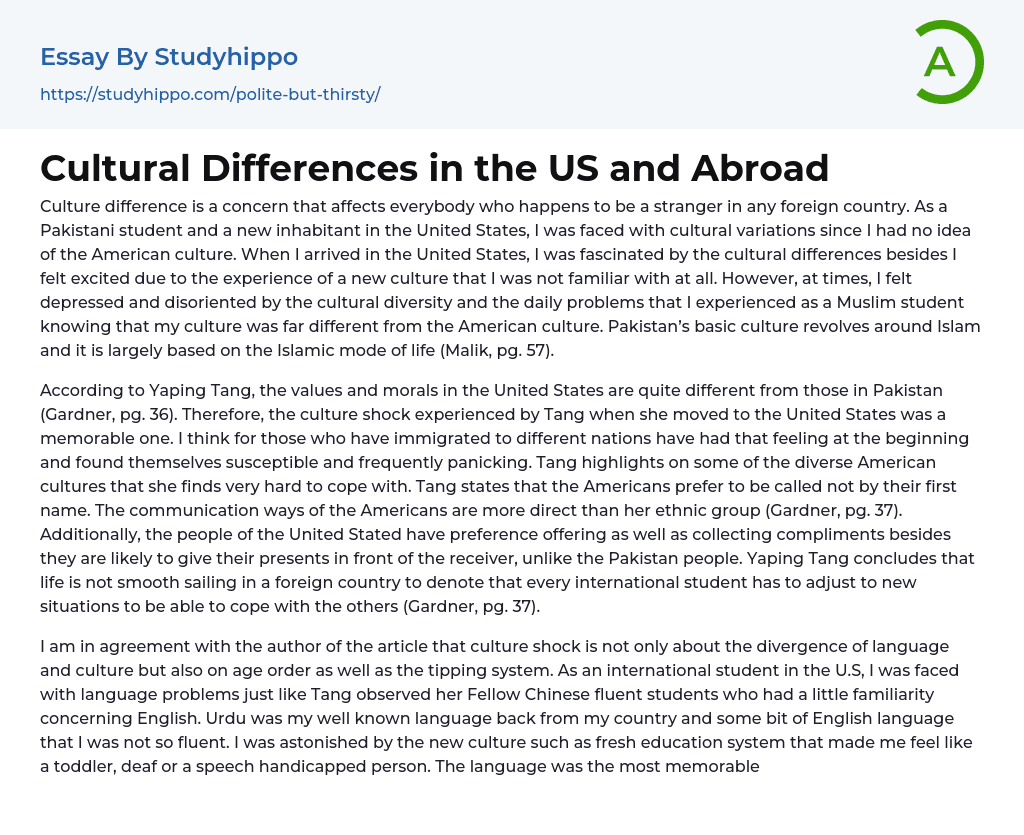As a Pakistani student and new resident in the United States, I encountered unfamiliar cultural differences. Despite my fascination and excitement to experience a new culture, there were moments when I felt depressed and disoriented as a Muslim student facing daily challenges. Being aware of the disparities between my own Islamic culture and American culture added extra stress (Malik, pg. 57).
Yaping Tang states that the values and morals in Pakistan differ greatly from those in the United States (Gardner, pg. 36). As a result, Tang experienced a memorable culture shock upon her move to the United States. I believe that many immigrants can relate to this initial feeling of susceptibility and frequent panic in a new country.
Tang discusses the challenges she faces in dealing with the diverse American cultures. She notes that Americans prefer to be addressed by thei
...r last name rather than their first name. Their communication style is more direct compared to her own ethnic group (Gardner, pg. 37). Furthermore, Americans are comfortable giving and receiving compliments, often presenting gifts in front of the recipient, whereas this is not common practice among the Pakistani people. Tang concludes that living in a foreign country is not easy, emphasizing the need for international students to adapt and adjust to new situations in order to interact effectively with others (Gardner, pg.).
37). Agreeing with the author of the article, I acknowledge that culture shock is not only about language and cultural differences but also includes disparities in age hierarchy and tipping practices. When I was an international student in the U.S, I faced similar language difficulties as Tang's Chinese classmates who struggled with English proficiency. In my
home country, I was proficient in Urdu and had some knowledge of English but lacked fluency. The new culture and education system in the U.S were overwhelming, making me feel like a beginner who couldn't hear or speak well. Dealing with the language barrier proved to be both challenging and unforgettable throughout my experience as an international student in America.
Before coming to the U.S., I lacked English speaking skills and had no experience conversing with native English speakers. Wearing traditional Pakistani clothing among my fellow students was uncomfortable due to the stark contrast between Muslim attire and American dress codes (Malik, pg. 182). These cultural aspects, particularly communication methods, have posed a challenge for me. Having lived in America for five months now despite being Korean by birth, one noticeable distinction between Korean and American cultures is that Americans do not ask direct questions as we do in our country.
In Pakistan, we typically ask direct questions with specific phrasing. I struggled to grasp and adapt to these different communication methods, which made it challenging for me to adjust quickly. Another issue I faced was the tipping system, which was unfamiliar to me in my country. Similar to Tang, I also had difficulty with the tipping system (Gardner, pg.).
39). In Pakistan, it is not customary to give tips after paying for a service. Our religious customs designate Friday as the holy day for worship and everything remains closed. This is different from the U.S.A, where Sunday is the designated worship day. Adapting to American culture was difficult for me.
As a Muslim, I faced the duty of praying five times daily. However, attending classes made
it challenging for me to fulfill this obligation as I had to skip them in order to pray (Malik, pg. 34). Living abroad had an impact on both my lifestyle and personality. It caused me to experience a sense of longing for reminders of my family and hometown in Pakistan. This feeling of homesickness often distracted me from my surroundings since I was separated from my loved ones while residing in a foreign country. Additionally, adapting to the customs and traditions of the United States proved to be a significant hurdle for me. Incorporating myself into another society and culture on a day-to-day basis posed as quite the challenge (Jong, pg.).
191). Finally, the other most critical effect was personal development as well as learning a new language
Work cited
- Jong, E. (2009). Culture and economics. London: Routledge.
- Malik, I. H. (2005). Culture and customs of Pakistan. Westport, Conn: Greenwood Press. Gardner, P. S.
(2008). New directions: Reading, writing, and critical thinking. New York: Cambridge University Press.
- American Culture essays
- Car Culture essays
- Cultural Differences essays
- Culture Shock essays
- Different Cultures essays
- Indian Culture essays
- Mexican Culture essays
- Mormon essays
- Pop Culture essays
- Popular Culture essays
- Adoption essays
- Aunt essays
- Babies essays
- Bedroom essays
- Caring essays
- Children essays
- Daughter essays
- Divorce essays
- Dog essays
- Dysfunctional Family essays
- Family Tradition essays
- Family Values essays
- Father essays
- Foster Care essays
- Friends essays
- Grandparent essays
- Home essays
- Hometown essays
- Husband essays
- Jealousy essays
- Love essays
- Marriage essays
- Mother essays
- Online Dating essays
- Parenting essays
- Parenting Teens essays
- Parents essays
- Relationship essays
- Room essays
- Sibling essays
- Sister essays
- Wedding essays
- Wife essays




